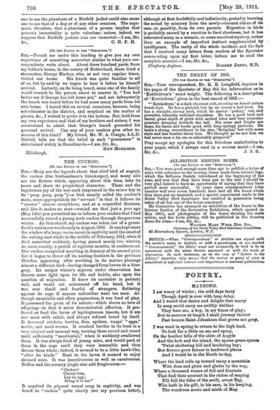THE CUCKOO.
[TO THE EDITOR OF THE "SPECTATOR."] SIR,—Many are the legends about that chief bird of augury, the cuckoo (the husbandman's time-keeper), and many also are the flowers which, appearing about this time, take its
name and share its prophetical character. These and the lugubrious joy of the wry-neck (expressed in the minor key in
its " peep, peep, peep ")—a bird usually called the cuckoo's mate, more appropriately its " servant " in that it follows its " master" almost everywhere, and at a respectful distance, and, like it, makes no nest—remind me that just a year ago (May 14th) you permitted me to inform your readers that I had successfully reared a young male cuckoo through the previous winter. As then stated, my cuckoo was taken out of a green-
finch's nest in our woods early in August, 1909. It was k ept (near the window of a large, warm room) in captivity until the onset of
the cutting east winds in the middle of February, 1911, when it died somewhat suddenly, having passed nearly two winters, or, more exactly, a period of eighteen months, in confinement. Our cuckoo completed moulting in January of its second year, but it began to throw off its nesting feathers in the previous October, appearing after moulting in its mature plumage almost a different bird—having changed from brown to a blue- grey. Its unique winter's sojourn under observation has thrown some light upon its life and habits, also upon the question of migration. It knew its caretaker (a patient) well, and would eat mincemeat off his hand, but it was ever timid and fearful of strangers, fluttering against its cage if anyone unfamiliar went too near. Al- though unamiable and often pugnacious, it was fond of play. It possessed the germ of its nature—which shows no love of offspring—in that it never demonstrated affection. It pre- ferred as food the lame of lepidopterous insects, but it ate raw meat with relish, and always refused bread by itself. It devoured crickets, beetles, flies, spiders, wasps' "eggs," moths, and meal-worms. It crushed beetles in its beak in a very original and unusual way, turning them round and round until sufficiently "masticated," when it suddenly swallowed them. It was always fond of young mice, and would peck at them in the cage until they were insensible and then devour them whole ; indeed, it seemed to be a little hawk-like, "after its kinde." Next to the lame it seemed to enjoy skinned mice. It was insectivorous as well as carnivorous. Buffon and the nursery jingle also add frugivorous
Cuckoo !
Cherry-tree, Lay an egg ; Bring it to me."
It acquired its piquant vernal song in captivity, and was heard to " cuckoo" quite clearly (see my previous letter), although at first doubtfully and indistinctly, probably learning the sound by mimicry from the newly-returned elders of its race, or, possibly, from its own parents. Migration in birds is probably caused by a reaction to food shortness, but it has interested many as a miracle, or some unsolved mystery, rather than an example of imperfect instinct supplemented by intelligence. The rarity of the whole incident, and the fact that I received many letters from readers of the Spectator commenting upon my first letter, induce me to send the complete account.—I am, Sir, &c., Claybury Asylum. ROBERT JONES, M.D.








































 Previous page
Previous page